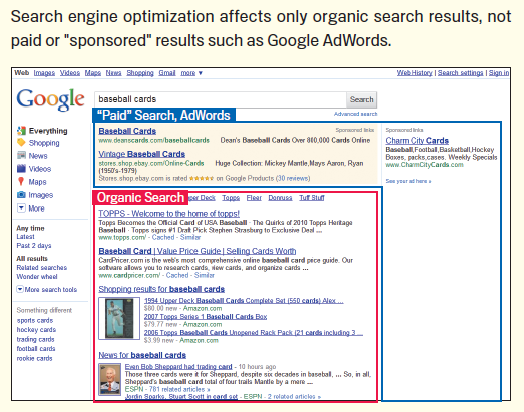When it comes to using search engines and the internet to market a law practice, there is still a lot of confusion out there. One area that many lawyers still don’t quite grasp are the differences between paid and organic search results.
When it comes to understanding Google, including the differences between paid and organic results, I like to start at the source. If you haven’t done so yet, I encourage you to check out Google’s Search Engine Optimization Starter Guide (.pdf). Here’s an illustration from the guide showing some differences between paid and organic results:

In a nutshell, advertisers pay Google for visibility in the paid search listing area. Advertisers cannot pay Google for listings in the organic search engine results. In order to gain visibility in the organic results, website owners must send “quality signals” to the search engine.
These quality signals take many forms but generally break down into two very general categories:
- Information on your web pages.
- Information on other web pages about your web pages.
More specifically, these signals include:
- Important HTML tags on your web pages.
- Links from other sites pointing to your web pages.
- Other mentions of your web pages on other web pages.
- The speed at which your web pages load.
- The organization of your web pages within your website’s structure.
- The quality and consistency of the information pertaining to your web pages.
It’s important to understand that gaining visibility within organic search engine results, especially for a brand new site, takes a lot of time and effort. On the other hand, visibility within paid search results happens as soon as you launch your advertising campaign.
So:
Visibility Within Organic Search Results = Long-term visibility strategy.
Visibility Within Paid Search Results = Immediate visibility strategy.
From another perspective, if you need potential client inquiries now, then you should be thinking about paid search. If you’re looking to make a long-term investment into your visibility on the web, then you should be thinking about organic search strategies.
And really, you should be thinking about both.
Can I Do This Stuff Myself?
Of course you can do it yourself. The better question is should you do it yourself?
Many lawyers, especially small firms and solos, need to keep their marketing costs low. And so, they launch websites on their own, dabble in paid search marketing, and even try to do a little SEO. And think that’s great. Assuming, of course, that they’ve spent some time educating themselves about effective web design, how to manage a paid search account, and how search engine optimization works. Unfortunately, many lawyers that go the do-it-yourself route, don’t.
And so, they end up launching an unprofessional website, waste serious money in paid search, and do some basic search engine optimization. Which usually results in, well, no results. So they conclude that internet marketing for lawyers just doesn’t work.
If you’re going to do this stuff yourself, here are my tips:
- Learn.
- Learn.
- Learn.
And if you’re going to hire someone to do it for you, well then, my advice is the same.
